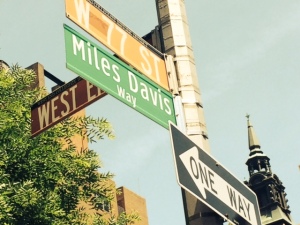Jazz inspires the developers of the WordPress software this blog uses. Since 2004 each major new version is named after a jazz musician, the first being Miles Davis. 10 years before he made the hip-hop/scratch pioneering Rock IT, Herbie Hancock was involved in another pioneering effort as one of the musicians who recorded On The Corner with Miles .
Both sides of the record were based around simple, repetitive drum and bass grooves (the track delineations on the original album were arbitrary), with the “melodic” parts snipped from hours of meandering jams. These techniques, refined via the use of computers and digital audio equipment, are now standard amongst producers of electronically-based music.
http://en.wikipedia.org/wiki/The_Complete_On_the_Corner_Sessions
Even the album cover art spoke to a digital theme:


In keeping with the sci-fi theme of African-American Music Month here on STEM Drum, On The Corner “sounded” like a soundtrack for a sci-fi movie. One writer wonders whether Miles actually invented the sci-fi/cyberpunk genre of William Gibson(inventor of the term cyberspace)
There’s also something cybernetic about that sound. The 1972 technology probably didn’t have many computers in the mix, but you can hear the hints toward sampling and digital editing. It is the street finding it’s own use for technology, but to a beat that William Gibson never imagined. It’s the shape of funk to come, pointing the way to rap, hip-hop, techno, the Afro-pop of King Sunny Ade and Fela Anikulapo Kuit.
Mondo Ernesto
Speaking of Gibson, I’m reminded of a picture I recently received from a friend which put a whole new meaning to “on the corner”

which makes me think of the locative art and augmented reality of Gibson’s Spook Country
Last but not least , Don Cheadle is using the tech-driven Indiegogo to help fund his Miles Ahead movie. Supporting these kinds of efforts will help keep more of the value of our innovation in the village.




You must be logged in to post a comment.